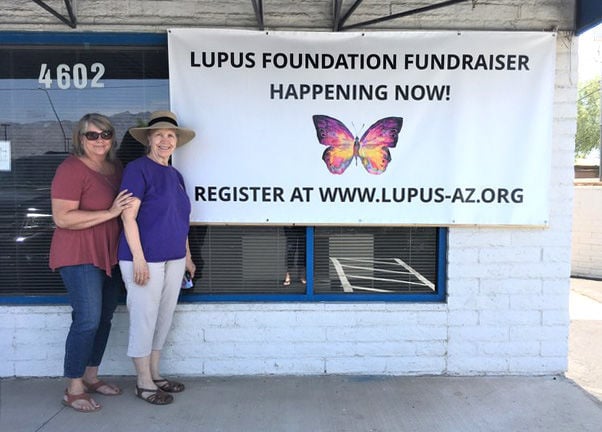Lupus is often known as “the silent disease.”
Sharon Joseph and Shaunna Kowalewski and other supporters of the Lupus Foundation of Southern Arizona seek to give people living with lupus a voice at the 19th Annual Virtual Walk the Loop for Lupus on Saturday, July 18.
“Lupus is such a debilitating disease. People call it ‘silent’ since many of those who have it look fine, but they are quite ill,” said Kowalewski, who is the chair of the fundraiser.
The event — which has gone online this year due to the COVID-19 pandemic — is the largest annual fundraiser for the foundation and will attempt to raise at least $25,000 to provide support, education and partnership to those affected by the chronic autoimmune disorder.
It also endeavors to promote awareness and dispel misconceptions about the disease, according to Joseph, who is president of the board of directors for the foundation.
She emphasized that lupus is not a cancer, is not contagious and is not rare.
“Lupus is often called the great imitator since it mimics other diseases and can be difficult to diagnose. More than 1.5 million Americans and 5 million people worldwide have it,” she said.
Lupus is classified as an autoimmune system illness in which the immune system loses its ability to tell the difference between foreign substances and its own cells and tissues. The immune system then begins forming antibodies against its own body, resulting in inflammation of various parts of the body.
It can present wide-ranging symptoms (skin rashes, arthritis-like swelling of joints, neurological disorders, pleuritis or pericarditis, renal and blood disorders, extreme fatigue, hair loss and more) that may come and go. There is no cure, but treatments are available to manage the three types of lupus.
The disease impacts primarily women (about 10% of cases are men) and can impact children as well as adults.
Joseph, who was diagnosed six years ago prior to her move to Tucson, experienced difficulties with diagnosis firsthand.
“I thought I had a cold with a horrible cough and became so weak that I had to go to the hospital, where I was diagnosed with pneumonia. During my hospital stay, my lungs filled with fluid and they realized I had stage three kidney disease and other complications. It was really rough going,” she said.
After her pneumonia improved, Joseph was discharged, but she ended up returning to the hospital shortly thereafter.
“I wasn’t going to leave until they figured out what was really going on. After lots of different tests, I had a bone biopsy and they finalized the diagnosis of systemic lupus erythematosus,” she said.
Joseph said that although individual experiences with lupus are all different, her experience is not uncommon.
“You can’t just take one blood test and be diagnosed: It takes time. Many people with lupus talk about how they had it for much longer and it was first diagnosed as something else,” she said.
Now under treatment with the drug Benlysta, Joseph considers herself fortunate that her lupus is well-controlled and that she has found a supportive community at the lupus foundation, which offers a range of services, including information, education and support groups for patients and their families.
Programs and services include an emergency medical fund and LFSA Cares, which provides nonmedical financial assistance to patients and their families. The organization also offers retreats for women with lupus and couples as well as scholarships for students with lupus. It recently started a support group for men with lupus and family members or partners of those with the disease.
Ultimately, the foundation represents a community of inspiring women and men, according to Kowalewski, who has several good friends living with lupus.
“I get to know thee women who overcome incredible physical and emotional hardships. I see the illness these women deal with and it feels good to be able to support women in their situations. They raise their families and have relationships and some have jobs and careers, while others are so disabled they can’t work or go to school. It is very inspirational. It is a give-back kind of foundation and I get a lot out of it,” Kowalewski said.
Kowalewski and Joseph highlighted the importance of community support for the foundation and other small health-related nonprofits as the nation is focused on the COVID-19 pandemic.
They acknowledged the social distancing necessitated by the situation has made fundraising and community-building more difficult and that support groups through Zoom are vital to combat the social isolation many people with chronic illnesses experienced even pre-COVID.
“We rely on outside funding for all of our operating costs and programs and all of our funds stay here to help people in Southern Arizona. It is hard to ask for funds at this time when there are people who aren’t working and people have been impacted by the pandemic in different ways. Whatever people can send our way, we appreciate,” said Joseph.





